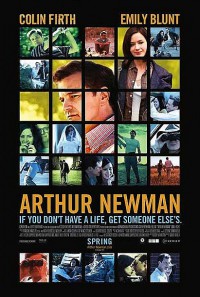 Running Time: 1hr 41min
Running Time: 1hr 41min
Rating: 3/5 stars
“What’s in a name?” Ask Wallace Avery (Colin Firth) at the beginning of “Arthur Newman” when he’s sitting alone on a deserted beach, plotting his own disappearance, he’s likely to tell you it’s anything you want it to be. That’s the response of a man who has had enough of his own life – a divorcee, a failed father and a wannabe golf pro turned FedEx floor manager. With life savings in hand, he stages his death at the beach and changes his identity to Arthur Newman. As easily as taking down the top in his new/used convertible Mercedes, he tries to begin again.
Leaving everything behind including his son Grant (Sterling Beaumon) and girlfriend Mina (Anne Heche), Arthur heads west, clinging to the promise of employment as golf instructor at a country club in Indiana. Along the way,
he crosses paths with Mike (Emily Blunt), a disturbed young transient who has also assumed another identity and is seeking escape from her troubled reality. Knowing that each is not who the other claims to be, but finding mutual solace and camaraderie in the fantasy, the unlikely pair hit the road together. Mike, being the younger, unrestrained spirit of the two drags Arthur into a spree of sexual and criminal role-playing games, breaking into homes of strangers and making love in the houses while wearing the owners’ clothes.
Their make believe world – almost innocent at times – shatters around them when they reach Indiana and Arthur finds no job awaiting him. With no fantasy to unite them and haunted by the worlds they left behind under former names, the duo head back the way they came and back to the lives they never thought they wanted.
It’s a quiet, character-driven little story from a little-known director, which owes what poignancy it has to the talents of its two leads. Despite the vast differences between their characterization, there is a remarkable amount of believable chemistry between Firth and Blunt – enough to gain our affections and to take us with them on their emotional journey. But stories with scarcely discernible plots are dogged by inescapable problems. There is no great obstacle to overcome for either of the protagonists. Most of the conflict is implied in bits of exposition or is revealed in the one subplot involving Grant who, over the course of the film, attempts to come to grips with the disappearance of a father who was seldom present in his life to begin with. Rather than the film being about a tangible narrative, it proceeds along a more existential route, raising questions about who we are versus who we wish we were. There is value in this, particularly as it ties into the film’s redemptive themes – of which
I am a fan. Yet seeking a powerful and meaningful resolution from a set of static circumstances doesn’t make for effective storytelling. A lack of driving needs rob good characters of their grounding in believability, and their choices don’t have the impact they may otherwise have had. As a result, “Arthur Newman” suffers a slow pace and an aimless feel throughout; in rooting for the happiness of both characters, you find yourself rooting more for something to happen. In spite of this, there is something lasting to be taken away. The character arc does beg the question to be asked of Wallace Avery again at the end of the film: “What’s in a name?” This time, he’d give you a very different answer.
—————————
For More Information Visit:
—————————
http://www.movieweb.com/movie/arthur-newman
http://www.imdb.com/title/tt1930546/combined